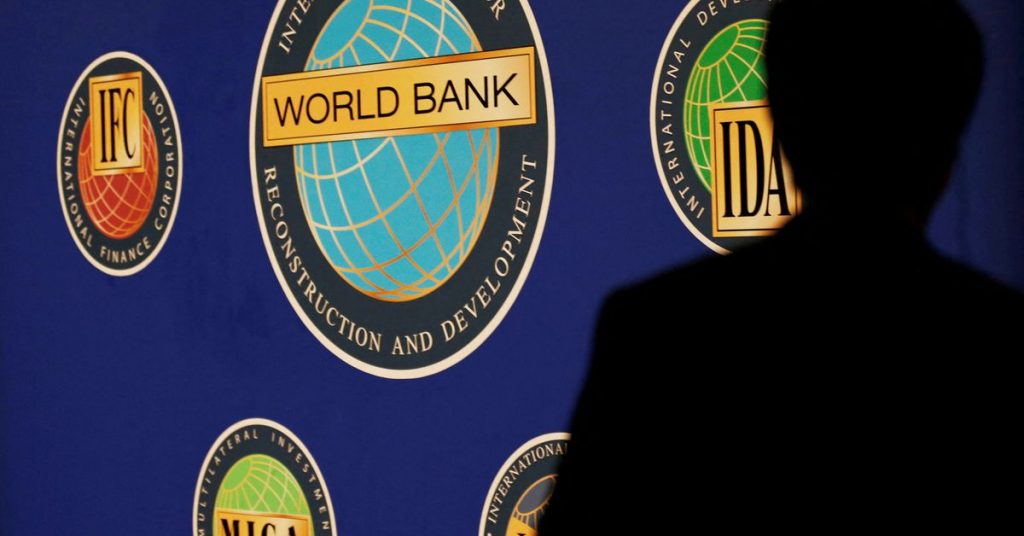A person is silhouetted in opposition to the emblem of the World Financial institution on the principal venue for the Worldwide Financial Fund (IMF) and World Financial institution annual assembly in Tokyo October 10, 2012. REUTERS/Kim Kyung-Hoon
Aug 30 (Reuters) – Mamadou Lamarana hoped the World Financial institution’s monetary involvement in a western Guinean bauxite mine growth would result in compensation for the lack of land and air pollution he says his group suffered within the run as much as their resettlement in 2020.
The 38-year-old electrician and representatives from 12 different villages complained three years in the past to World Financial institution affiliate Worldwide Finance Company (IFC) that the undertaking developer, state-backed Compagnies des Bauxites de Guinee (CBG), had not made up for injury it had induced since 1973.
The villagers say they need their mined land rehabilitated and their communities compensated. They hoped the IFC, which contributed $200 million to finance the mine’s growth, would come by way of for them.
However the IFC and different main improvement banks, such because the Asian Improvement Financial institution and the African Improvement Financial institution, have lengthy resisted compensating communities impacted by the initiatives they finance, whilst they acknowledge builders usually fall quick.
An increase in complaints about initiatives similar to these in Guinea have prompted activists to push improvement banks to contribute to compensation.
One activist group, the non-profit Accountability Counsel, factors to a 231% rise in complaints between 2009 and 2019 as proof improvement banks are backing initiatives with out regard for communities. Simply 16.4% of 1,614 complaints filed since 1994 have reached a proper conclusion, it added.
An IFC spokesperson stated the financial institution was working intently with CBG to handle villagers’ considerations and that it was dedicated to the mediation course of.
As a substitute of compensation, the IFC factors to its unbiased complaints course of which facilitates talks between undertaking builders and communities, in addition to recommends adjustments to the financial institution’s rulebook for future initiatives.
Within the case of the mine in Guinea, the mediation talks had been pre-empted. CBG, which is partly owned by Rio Tinto Plc (RIO.L) and Alcoa Corp (AA.N), relocated Lamarana’s village on the eve of the scheduled negotiations in 2020.
CBG had promised 56 hectares of farmland to Lamarana’s group however delivered solely 22 hectares, Lamarana stated. The brand new land had been beforehand mined and was shorn of the topsoil wanted to develop meals for a residing, he added.
“They advised us our new village can be like a mirror of Africa, as a result of it might be so lovely. However they didn’t try this,” Lamarana stated in an interview.
A CBG spokesperson stated the corporate was dedicated to restoring all the farmland and was sponsoring livelihood restoration programmes together with on poultry manufacturing and sustainable agriculture.
The spokesperson additionally stated CBG had paid some money or in-kind compensation for affected land, crops and timber, however declined to offer a determine, citing confidentiality necessities.
Lamarana stated he had acquired a number of small funds because the mine step by step encroached on his land, however argues he and the group are entitled to extra. He declined to say how a lot he acquired in compensation, citing the continued negotiations.
The IFC spokesperson advised Reuters it was contemplating a brand new framework that would embody monetary help or in-kind actions by the IFC for the affected communities “in distinctive circumstances,” with out specifying what these circumstances can be.
STRICTER REQUIREMENTS
David Pred, president of Inclusive Improvement Worldwide (IDI), a non-profit serving to these harmed by improvement initiatives, stated the IFC ought to stagger its mortgage disbursements and tie them to debtors assembly its excessive environmental and social requirements. It also needs to ask for cash for compensation to be put aside upfront, he added.
“If the IFC did simply these two issues, the communities in (Guinea) can be in a really totally different place immediately by way of having the ability to safe redress and it might have probably prevented a number of the harms that we have seen for the reason that growth undertaking received underway,” Pred stated.
The IFC does stagger disbursements for some compensation however it’s not clear whether or not they did that for the CBG undertaking.
The IFC spokesperson stated the financial institution was contemplating requiring undertaking builders to take out insurance coverage as one choice to cowl the price of potential compensation. Nonetheless, the spokesperson added if undertaking builders are saddled with too many prices they could be discouraged from working with the IFC within the first place.
“If we do not find yourself with the best stability on this framework, there’s a concern we might lose enterprise and have much less of an influence,” the spokesperson stated.
Reporting by Emma Rumney and Simmon Jessop in London and Sofia Christensen in Dakar; Enhancing by Greg Roumeliotis and Josie Kao
: .


